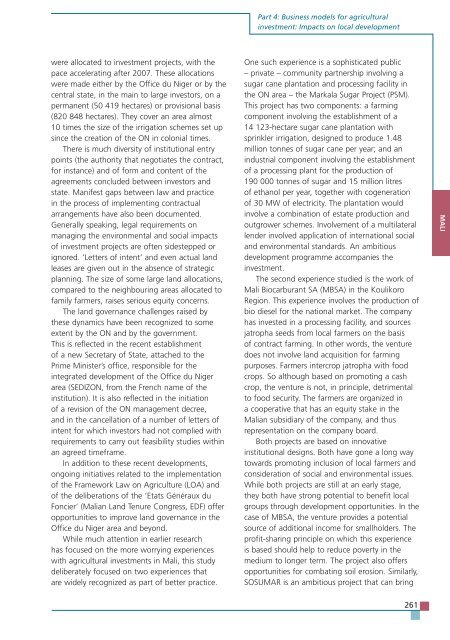TRENDS AND IMPACTS OF FOREIGN INVESTMENT IN DEVELOPING COUNTRY AGRICULTURE
TRENDS AND IMPACTS OF FOREIGN INVESTMENT IN DEVELOPING COUNTRY AGRICULTURE
TRENDS AND IMPACTS OF FOREIGN INVESTMENT IN DEVELOPING COUNTRY AGRICULTURE
Create successful ePaper yourself
Turn your PDF publications into a flip-book with our unique Google optimized e-Paper software.
were allocated to investment projects, with the<br />
pace accelerating after 2007. These allocations<br />
were made either by the Office du Niger or by the<br />
central state, in the main to large investors, on a<br />
permanent (50 419 hectares) or provisional basis<br />
(820 848 hectares). They cover an area almost<br />
10 times the size of the irrigation schemes set up<br />
since the creation of the ON in colonial times.<br />
There is much diversity of institutional entry<br />
points (the authority that negotiates the contract,<br />
for instance) and of form and content of the<br />
agreements concluded between investors and<br />
state. Manifest gaps between law and practice<br />
in the process of implementing contractual<br />
arrangements have also been documented.<br />
Generally speaking, legal requirements on<br />
managing the environmental and social impacts<br />
of investment projects are often sidestepped or<br />
ignored. ‘Letters of intent’ and even actual land<br />
leases are given out in the absence of strategic<br />
planning. The size of some large land allocations,<br />
compared to the neighbouring areas allocated to<br />
family farmers, raises serious equity concerns.<br />
The land governance challenges raised by<br />
these dynamics have been recognized to some<br />
extent by the ON and by the government.<br />
This is reflected in the recent establishment<br />
of a new Secretary of State, attached to the<br />
Prime Minister’s office, responsible for the<br />
integrated development of the Office du Niger<br />
area (SEDIZON, from the French name of the<br />
institution). It is also reflected in the initiation<br />
of a revision of the ON management decree,<br />
and in the cancellation of a number of letters of<br />
intent for which investors had not complied with<br />
requirements to carry out feasibility studies within<br />
an agreed timeframe.<br />
In addition to these recent developments,<br />
ongoing initiatives related to the implementation<br />
of the Framework Law on Agriculture (LOA) and<br />
of the deliberations of the ‘Etats Généraux du<br />
Foncier’ (Malian Land Tenure Congress, EDF) offer<br />
opportunities to improve land governance in the<br />
Office du Niger area and beyond.<br />
While much attention in earlier research<br />
has focused on the more worrying experiences<br />
with agricultural investments in Mali, this study<br />
deliberately focused on two experiences that<br />
are widely recognized as part of better practice.<br />
Part 4: Business models for agricultural<br />
investment: Impacts on local development<br />
One such experience is a sophisticated public<br />
– private – community partnership involving a<br />
sugar cane plantation and processing facility in<br />
the ON area – the Markala Sugar Project (PSM).<br />
This project has two components: a farming<br />
component involving the establishment of a<br />
14 123-hectare sugar cane plantation with<br />
sprinkler irrigation, designed to produce 1.48<br />
million tonnes of sugar cane per year; and an<br />
industrial component involving the establishment<br />
of a processing plant for the production of<br />
190 000 tonnes of sugar and 15 million litres<br />
of ethanol per year, together with cogeneration<br />
of 30 MW of electricity. The plantation would<br />
involve a combination of estate production and<br />
outgrower schemes. Involvement of a multilateral<br />
lender involved application of international social<br />
and environmental standards. An ambitious<br />
development programme accompanies the<br />
investment.<br />
The second experience studied is the work of<br />
Mali Biocarburant SA (MBSA) in the Koulikoro<br />
Region. This experience involves the production of<br />
bio diesel for the national market. The company<br />
has invested in a processing facility, and sources<br />
jatropha seeds from local farmers on the basis<br />
of contract farming. In other words, the venture<br />
does not involve land acquisition for farming<br />
purposes. Farmers intercrop jatropha with food<br />
crops. So although based on promoting a cash<br />
crop, the venture is not, in principle, detrimental<br />
to food security. The farmers are organized in<br />
a cooperative that has an equity stake in the<br />
Malian subsidiary of the company, and thus<br />
representation on the company board.<br />
Both projects are based on innovative<br />
institutional designs. Both have gone a long way<br />
towards promoting inclusion of local farmers and<br />
consideration of social and environmental issues.<br />
While both projects are still at an early stage,<br />
they both have strong potential to benefit local<br />
groups through development opportunities. In the<br />
case of MBSA, the venture provides a potential<br />
source of additional income for smallholders. The<br />
profit-sharing principle on which this experience<br />
is based should help to reduce poverty in the<br />
medium to longer term. The project also offers<br />
opportunities for combating soil erosion. Similarly,<br />
SOSUMAR is an ambitious project that can bring<br />
261<br />
MALI


